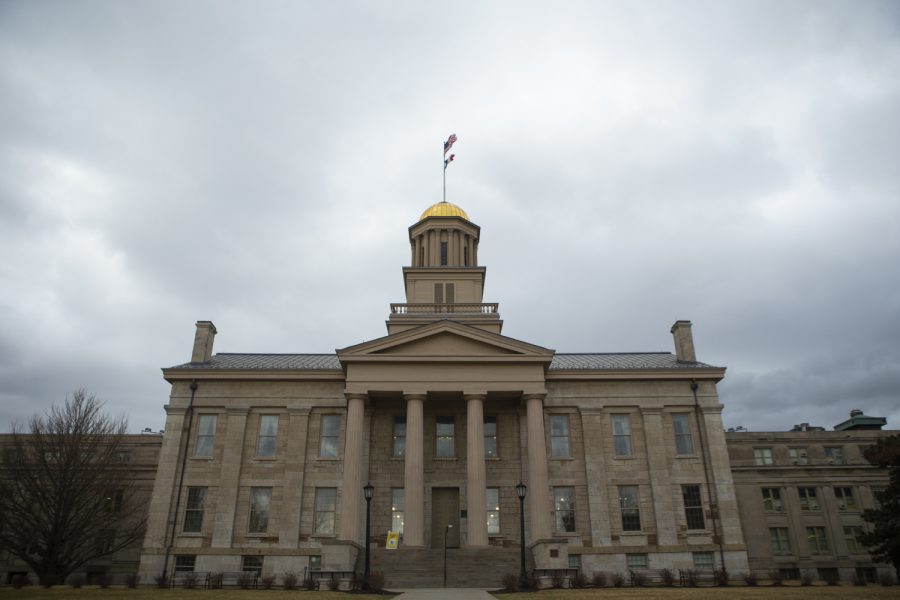University of Iowa professors speak on concerns over immigration in America
With Election Day arriving tomorrow, professors at the university expressed predictions and concerns over immigration policies from both presidents for America.
The Old Capitol is seen on Thursday, March 12, 2020.
November 2, 2020
University of Iowa professors across different disciplines are speaking out about present and future policies concerning immigration in the U.S., saying the upcoming election will determine the future of these policies.
Jaromy Floriano Navarro, an immigrant woman at the Irwin County Detention Center in Georgia, recently spoke out about how she was pressured to have a hysterectomy without her knowledge, said UI professor in the Department of Gender, Women’s and Sexuality Studies and History Lina-Maria Murillo.
Murillo said Navarro is one of 19 women that have spoken out about their experiences with immigration officials within the last three weeks.
Murillo said her manuscript, “Fighting for Control: Race and Reproductive Rights Activism in the U.S-Mexico Borderlands,” discusses certain reproductive rights for Mexican women that have a dark and unknown history, such as abortion and population control in the borderlands.
She said the American Civil Liberties Union recently revealed there are currently 545 children who were separated from their parents that the ACLU cannot find.
“These two acts of reproductive injustice at the border are from an administration that wholeheartedly screamed about their pro-life, pro-family, and pro-tradition stance is kind of the height of hypocrisy,” she said.
Cages to hold undocumented immigrants were built under the Obama administration, Murillo said, but the Trump administration has filled them. She said the idea of detention centers and prisons for those who cross the border dates back to the turn of the 20th century.
The Trump administration made the zero-tolerance policy toward illegal immigration official in May 2018. Trump rescinded the family separation policy after it sparked public outcry in June 2018.
UI professor of American and Latino Studies Eric Vázquez said he questions what Americans have done to be “deserving” of being born in the U.S. If citizenship is based on being born here, he said, no one has done anything to deserve that. He feels as though this makes Latinos’ lives seem not worth as much as others, Vázquez said.
“Personally, as a Latino, it hit me the wrong way … and it made me feel like the U.S. government would rather I had never been born, because essentially that’s what they’re doing by eliminating these women’s ability to reproduce,” he said.
For the past 30 years, Vázquez said immigration has been a turning point between right and left.
“This kind of punitive approach to immigration, which I think is not unprecedented in American history, is a unique ramping up that has happened particularly with this administration,” Vázquez said.
Both Vázquez and Murillo said current immigration policies are not just enforced by Trump himself, but also by people within his administration, such as Jeff Sessions and Stephen Miller. They agreed that Sessions and Miller are influential Republican conservatives that have anti-immigration opinions they willingly vocalize.
If Biden wins the presidential election, however, that does not necessarily mean immigration policies will automatically improve, because the immigration system has deep roots, Murillo said.
UI Political Science Professor, Ambassador in Residence, and former U.S. Foreign Services Officer Ronald McMullensaid, if President Trump loses and Joe Biden is sworn in, Biden would have to depend on Congress to enact a new set of immigration laws to adjust the admittance process into the U.S.
“If the Democrats take the White House and the Senate and hold the House, there could be wholesale immigration reform,” he said. “But, even if the Republicans hold the Senate, [Biden] can undo a lot of the sharpest Trump administration executive orders.”
McMullen said some of these orders include the visa ban from Muslim countries and the asylum process. Under the Trump administration, only 5,000 refugees were accepted out of a maximum of 50,000, he said.
He predicts that if Trump is reelected, this number could change to zero, McMullen said.
“We are a country in which our foundations are moral — we believe in individual liberties and human rights. So, I think it’s the right thing to do to help people that are fleeing oppression,” McMullen said. “It’s the right thing to do and a moral thing to do, and it relates to America’s foundations.”
McMullen said that immigrants can be very beneficial to America because they provide labor, especially in Iowa with its agriculture and meat-packing plants.
Almost 400 immigrants that were employees of the Agriprocessors meatpacking plant were taken into custody by immigration agents in 2008. As previously reported by the Des Moines Register, a decade later, some are looking to move past the raid and focus on rebuilding their identity, while others are using the raid to make changes in immigration policy.
Murillo said what happened in Postville, Iowa, represents many areas where immigrants have been arrested and uprooted by ICE.
“The entire community [of Postville] was shocked and appalled that that happened,” she said. “Despite folks not being white Americans, they were still seen as part of their community, and it was a shock to this small town in Iowa.”
Murillo said the backbone of Iowa’s economy comes from immigrants working in the slaughterhouses and meat packing plants in Iowa. Even if they are undocumented, she said, they are still having taxes taken out of their paychecks and are keeping small towns in Iowa alive.
Vázquez said it’s easy to forget America’s immigration history from Europe and that a majority of Americans were here originally.
“It’s a hard line as a whole when you want to think about what rights are intrinsic to human beings. That’s sort of one of the things that makes America unique in the world — that even if you’re not a citizen of the U.S., you are meant to have certain human rights,” he said. “And the way that policy has been in this country, you don’t even have a right to habeas corpus or due process.”





